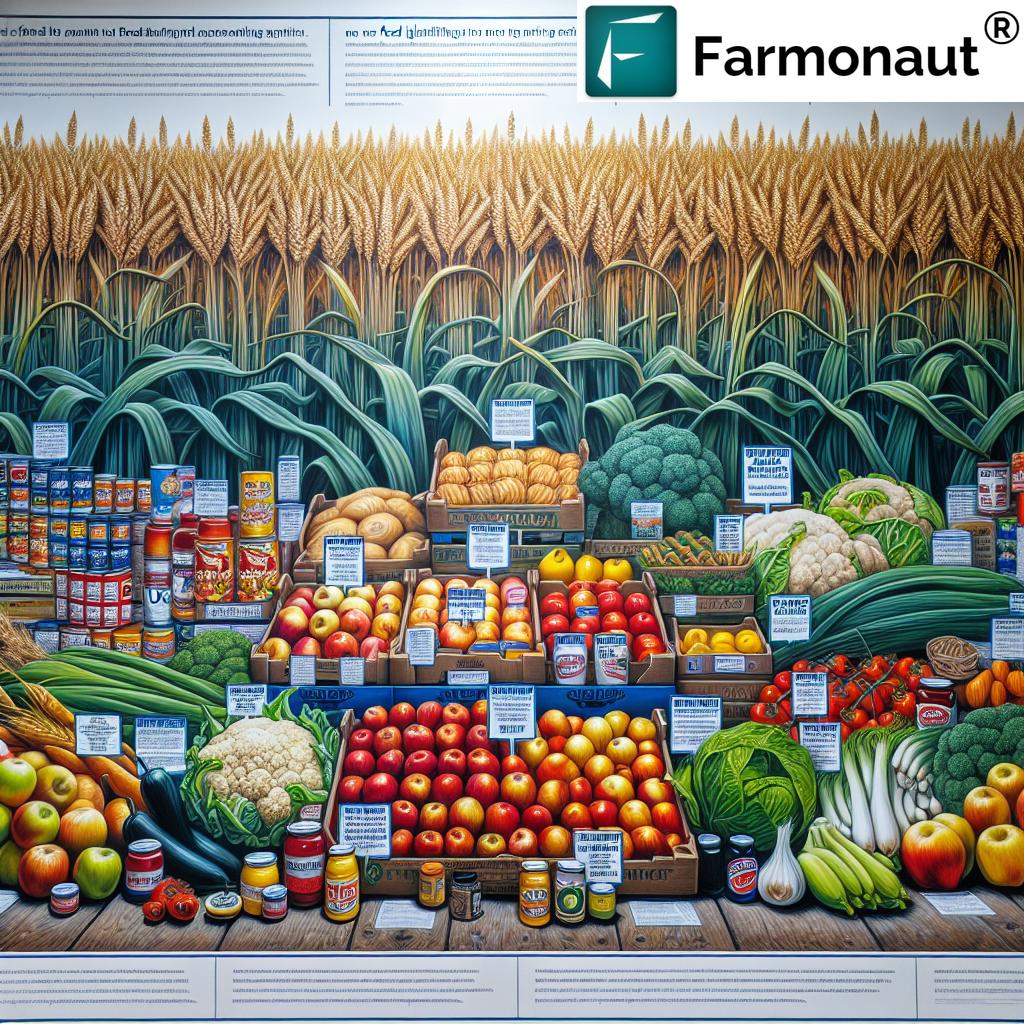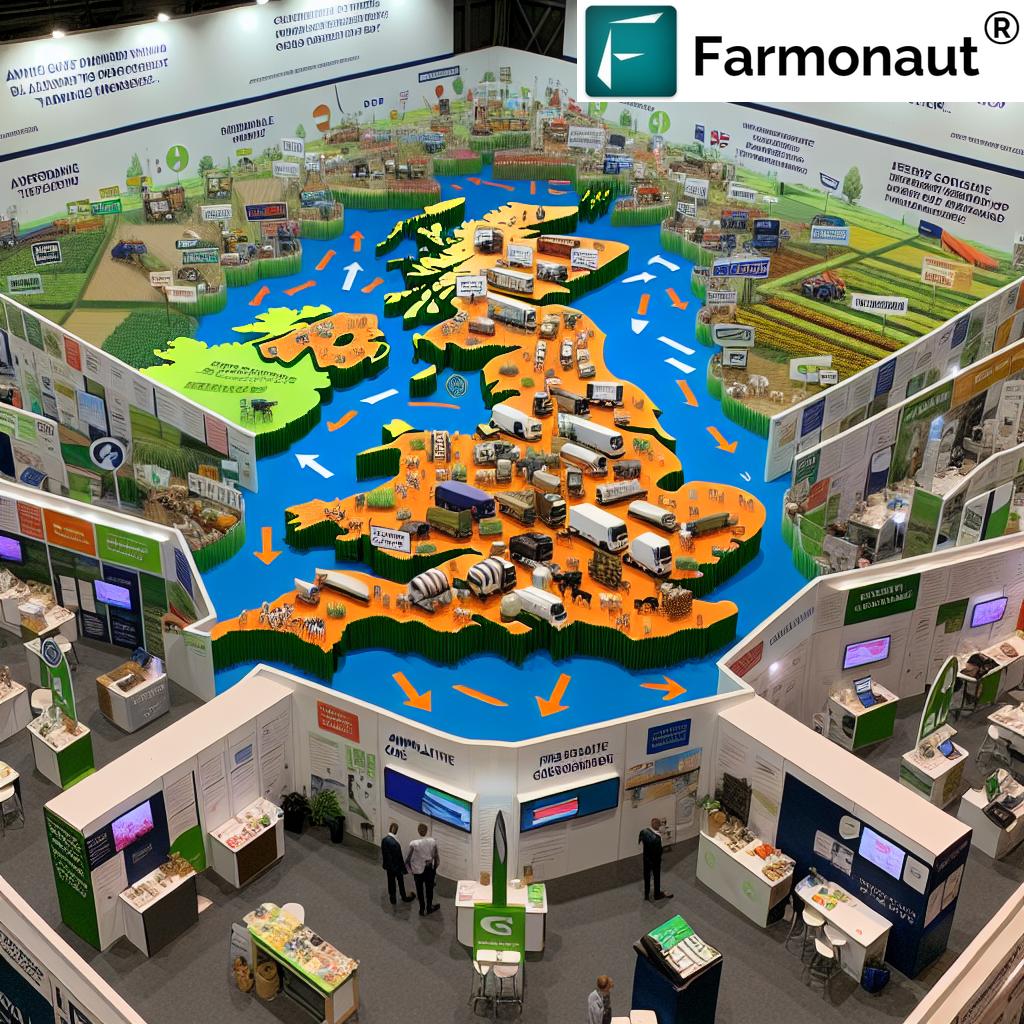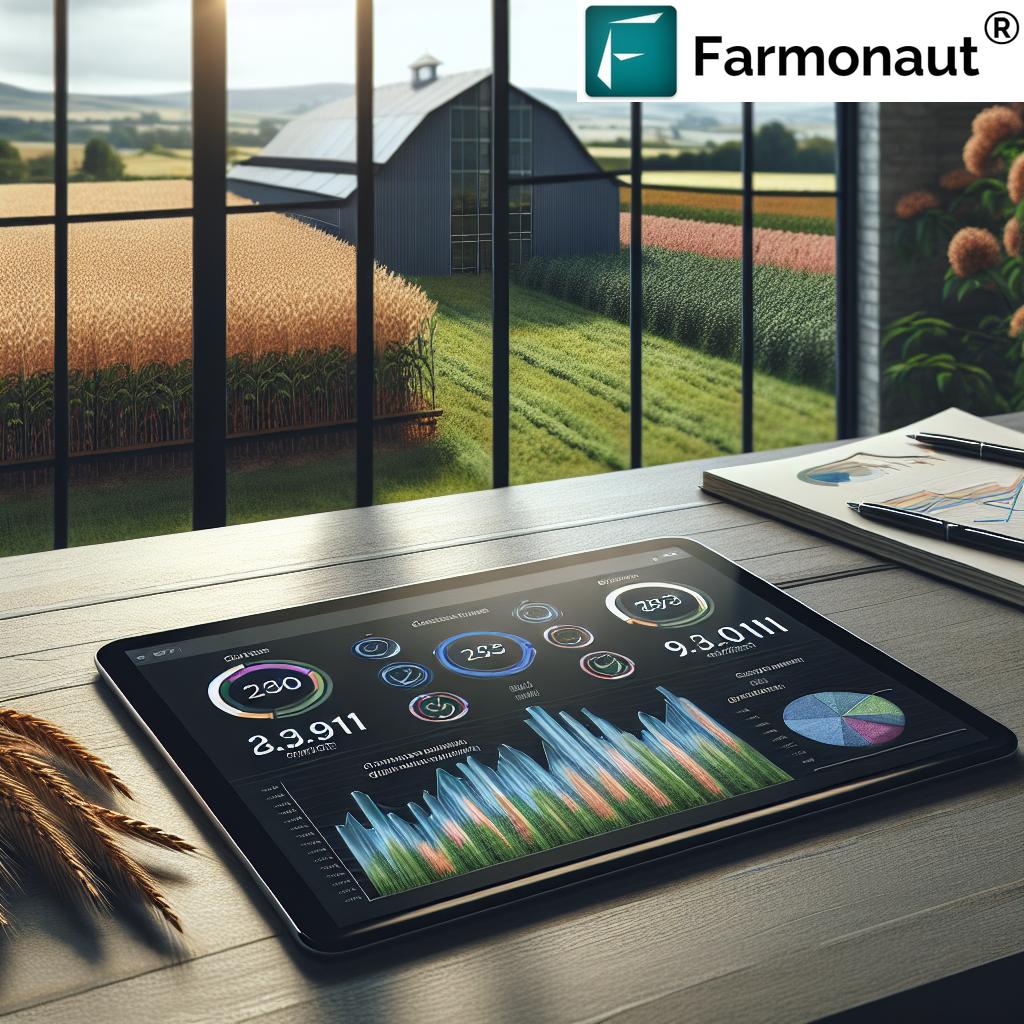UK Government Scraps ‘Not for EU’ Food Labelling: Impact on British Farming and Agri-Food Trade
“The UK government’s decision on food labelling affects over 9,000 British food and drink manufacturing businesses.”
In a significant move that’s set to reshape the landscape of UK food labelling regulations and agri-food product labelling, the British government has announced its decision to scrap the proposed ‘Not for EU’ labelling requirements across Great Britain. This pivotal development in 2024 marks a crucial shift in British farming policies and agricultural supply chain management, with far-reaching implications for farmers, producers, and consumers alike.
At Farmonaut, we recognize the importance of staying abreast of such industry-altering changes. As a leading provider of satellite-based farm management solutions, we’re committed to helping our clients navigate the evolving regulatory landscape while optimizing their agricultural practices. Let’s delve into the details of this policy change and explore its multifaceted impact on the UK’s farming sector.
Understanding the ‘Not for EU’ Labelling Decision
The UK government’s decision not to implement ‘Not for EU’ labelling requirements comes after extensive stakeholder consultations and careful consideration of industry feedback. This move addresses concerns raised by industry leaders about potential confusion in the market and the added complexities it would introduce to the agricultural supply chain.
- The decision affects food and drink products produced and sold in Great Britain
- It aims to simplify compliance for British farmers and food producers
- The change is expected to reduce potential trade barriers with the EU
This policy shift is particularly significant in the context of the ongoing discussions surrounding the Windsor Framework Agreement and its impact on Northern Ireland food trade. As we navigate these changes, tools like Farmonaut’s satellite-based crop monitoring can help farmers adapt their practices efficiently.

Implications for British Farming and Agri-Food Trade
The scrapping of ‘Not for EU’ labelling requirements has several significant implications for British farming and the agri-food sector:
- Reduced Compliance Burden: British farmers and food producers will face fewer regulatory hurdles, potentially leading to cost savings and increased efficiency.
- Improved Market Access: The decision may facilitate easier access to EU markets for British products, supporting international trade.
- Consumer Clarity: By avoiding potentially confusing labelling, consumers both in the UK and EU may find it easier to understand product origins.
- Supply Chain Simplification: The agricultural supply chain management process is expected to become more streamlined without the additional labelling requirement.
These changes underscore the importance of adaptable farming practices and efficient resource management. Farmonaut’s satellite-based farm management solutions can help farmers optimize their operations in this changing landscape.
Impact on UK-EU Trade Regulations
The decision to scrap ‘Not for EU’ labelling is expected to have a significant impact on UK-EU trade regulations:
- Potential for smoother trade flows between the UK and EU
- Reduced regulatory divergence in food labelling standards
- Possible positive influence on ongoing trade negotiations
As these trade dynamics evolve, British farmers may need to adjust their production strategies. Farmonaut’s AI-powered advisory system, Jeevn AI, can provide valuable insights to help farmers make informed decisions in this changing trade environment.
Food Origin Labelling: Balancing Information and Practicality
The debate around food origin labelling highlights the delicate balance between providing consumer information and maintaining practical industry standards. The government’s decision reflects an attempt to strike this balance:
- Ensuring transparency without overburdening producers
- Maintaining consumer trust while supporting industry efficiency
- Aligning with international standards to facilitate trade
In this context, Farmonaut’s blockchain-based traceability solutions can play a crucial role in ensuring transparency and building consumer trust without adding unnecessary complexity to labelling requirements.
“The agri-food sector contributes approximately £120 billion annually to the UK economy, impacted by labelling changes.”

Agri-Food Sector Compliance: Navigating the Changes
The decision to scrap ‘Not for EU’ labelling will require adjustments in agri-food sector compliance:
- Updated guidance for food producers and retailers
- Potential revisions to existing labelling practices
- Need for clear communication across the supply chain
Farmonaut’s comprehensive farm management platform can assist in tracking and managing these compliance changes efficiently. Our API allows for seamless integration of compliance data into existing systems.
Sustainable Farming Practices in Light of Policy Changes
The labelling decision also has implications for sustainable farming practices:
- Potential for increased focus on local and regional production
- Opportunities for promoting sustainable British farming methods
- Need for efficient resource management to maintain competitiveness
Farmonaut’s satellite-based crop health monitoring and resource management tools can help farmers adopt and maintain sustainable practices while navigating these policy changes.
Northern Ireland: A Special Case
The situation in Northern Ireland remains unique due to the Windsor Framework Agreement:
- Different labelling requirements may apply for goods moving between GB and NI
- Continued alignment with EU regulations for certain products
- Potential for divergent practices between NI and the rest of the UK
Farmers and producers in Northern Ireland may need specialized support to navigate these complexities. Farmonaut’s customizable solutions can be tailored to meet the specific needs of NI farmers.
Impact on Different Agricultural Sectors
The labelling changes will affect various agricultural sectors differently:
| Sector | Previous Labelling Requirements | New Labelling Requirements | Estimated Cost Savings for Farmers (%) | Potential Impact on EU Exports | Compliance Challenges (1-5 scale) | Consumer Impact |
|---|---|---|---|---|---|---|
| Dairy | Country of origin + ‘Not for EU’ | Country of origin only | 5-10% | Medium | 2 | Neutral |
| Meat | Detailed origin + ‘Not for EU’ | Detailed origin only | 8-15% | High | 3 | Positive |
| Produce | Country/Region + ‘Not for EU’ | Country/Region only | 3-7% | Low | 1 | Neutral |
| Processed Foods | Complex origin + ‘Not for EU’ | Simplified origin labelling | 10-20% | Medium | 4 | Positive |
| Organic Products | Organic certification + ‘Not for EU’ | Organic certification only | 6-12% | High | 2 | Positive |
Farmonaut’s sector-specific solutions can help farmers in each of these areas adapt to the new requirements efficiently.
Consumer Perspective: Understanding the Changes
From a consumer standpoint, the labelling changes may have several effects:
- Potential for initial confusion as labels change
- Increased focus on clear country of origin information
- Possible perception of improved access to British products in the EU
Clear communication will be crucial in ensuring consumer understanding. Farmonaut’s traceability solutions can provide consumers with detailed product information, enhancing transparency and trust.
Retail Market Adjustments
The retail sector will need to adapt to these labelling changes:
- Updating product packaging and information systems
- Training staff on new labelling requirements
- Potentially revising sourcing strategies
Retailers can benefit from Farmonaut’s data-driven insights to make informed decisions about sourcing and inventory management in light of these changes.
Future of British Farming: Opportunities and Challenges
The labelling decision opens up new opportunities and challenges for British farming:
- Potential for increased competitiveness in both domestic and EU markets
- Need for continued innovation in farming practices
- Importance of adapting to changing consumer preferences and market demands
Farmonaut’s advanced agricultural solutions, including our API Developer Docs, can help farmers stay at the forefront of these industry changes.
Government Support and Resources
The UK government is expected to provide support to farmers and producers as they navigate these changes:
- Updated guidance documents and resources
- Potential financial support for transitioning labelling practices
- Ongoing consultations with industry stakeholders
Farmers can leverage Farmonaut’s technology to efficiently implement these changes and make the most of available government resources.
International Trade Implications
The labelling decision may have broader international trade implications:
- Potential for improved trade relations with the EU
- Possible impact on trade agreements with other countries
- Need for continued alignment with international food standards
Farmonaut’s global perspective and advanced analytics can help farmers understand and adapt to these international trade dynamics.
Technological Adaptations in Farming
As the agricultural landscape evolves, technological adaptations will be crucial:
- Increased adoption of precision farming techniques
- Integration of AI and machine learning in farm management
- Enhanced use of data analytics for decision-making
Farmonaut’s cutting-edge technologies, including our  and
and  , are designed to support farmers in this technological transition.
, are designed to support farmers in this technological transition.
Environmental Considerations
The labelling changes may also have environmental implications:
- Potential for reduced packaging waste
- Opportunities for promoting environmentally friendly farming practices
- Need for balancing trade and environmental concerns
Farmonaut’s sustainability-focused solutions can help farmers monitor and reduce their environmental impact while maintaining productivity.
Conclusion: Navigating the Future of British Farming
The UK government’s decision to scrap ‘Not for EU’ food labelling marks a significant shift in British farming policies and agri-food trade regulations. While it presents both opportunities and challenges, it ultimately aims to simplify processes for farmers and producers while maintaining consumer trust and international competitiveness.
As the agricultural sector adapts to these changes, the role of technology and data-driven decision-making becomes increasingly crucial. Farmonaut stands ready to support farmers, producers, and the entire agri-food sector with our advanced satellite-based farm management solutions, AI-powered advisory systems, and blockchain-based traceability tools.
By leveraging these technologies, British farmers can not only navigate the current regulatory changes but also position themselves at the forefront of sustainable and efficient farming practices. As we move forward, the focus will be on balancing regulatory compliance, market demands, and sustainable farming practices to ensure a thriving future for British agriculture.
Stay informed, stay adaptive, and let Farmonaut be your partner in navigating the evolving landscape of British farming and agri-food trade.
FAQs
- Q: How will the scrapping of ‘Not for EU’ labelling affect British farmers?
A: British farmers are likely to benefit from reduced compliance burdens and potentially improved access to EU markets. However, they may need to adapt their labelling practices and ensure continued alignment with UK and EU standards. - Q: Will this change affect food safety standards in the UK?
A: No, the change in labelling requirements does not affect food safety standards. The UK will continue to maintain high food safety standards in line with current regulations. - Q: How does this decision impact Northern Ireland?
A: Northern Ireland remains a special case due to the Windsor Framework Agreement. Different labelling requirements may still apply for goods moving between Great Britain and Northern Ireland. - Q: Will consumers notice any changes in product labelling?
A: Consumers may notice slight changes in product labelling, primarily the absence of ‘Not for EU’ markings. However, essential information such as country of origin will still be prominently displayed. - Q: How can farmers adapt to these new labelling requirements?
A: Farmers can adapt by staying informed about the new regulations, updating their labelling practices, and leveraging technology solutions like Farmonaut to optimize their operations and ensure compliance.


















